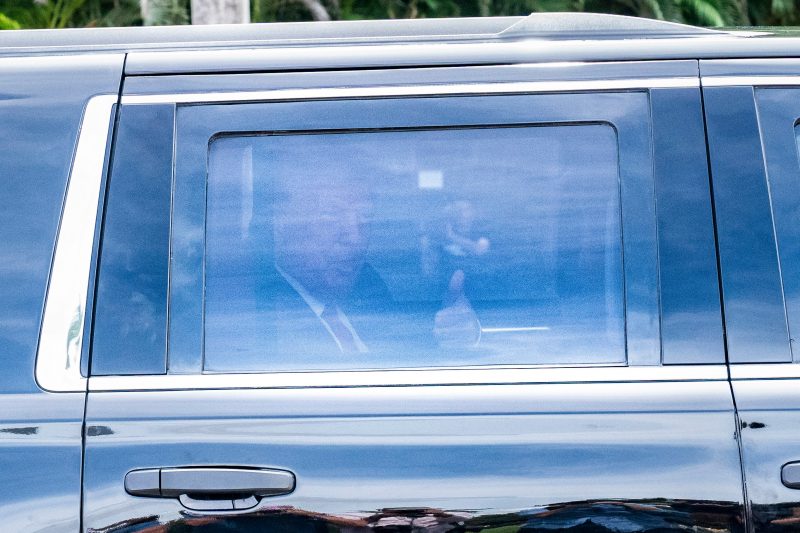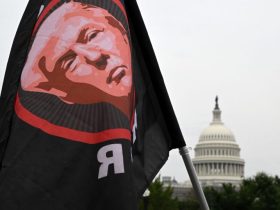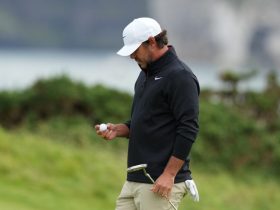Donald Trump spent the day before his historic appearance in federal court scrambling to find a qualified Florida lawyer willing to join his defense team as he faces the Justice Department’s first prosecution of a former president.
After touching down in Miami on Monday, Trump spent the afternoon interviewing prospective lawyers and meeting with his legal team, along with other top advisers, to discuss the case, in which he is accused of mishandling classified documents and obstructing the government’s efforts to retrieve them, according to people familiar with the sessions. Several prominent Florida attorneys declined to take Trump on as a client after two of the key lawyers handling the documents matter — Jim Trusty and John Rowley — resigned last week, according to people familiar with the matter.
A Trump adviser said late Monday that Trump would be joined in court by Todd Blanche, an attorney handling his case in New York, as well as veteran Florida litigator Christoper Kise. On the Truth Social platform, Trump had said last week that Blanche would lead his defense along with “a firm to be named later.”
Kise had been hired to help deal with the documents case last year but had previously reduced his role over disagreements with Trump’s legal strategy and may not handle the matter going forward, people familiar with the case have said.
Trusty and Rowley’s departure was sudden and unexpected, leaving Trump jockeying to identify a lawyer ahead of his Tuesday appearance in federal court in Miami, where rules require practicing attorneys to be a member in good standing of the Florida bar or to be sponsored by one before appearing. Kise, who has led the search for a lawyer and cast a seemingly wide net in the state. He declined to comment.
The 11th-hour flurry of action to hire a seasoned trial attorney was a familiar dance for Trump, who has had difficulty hiring and keeping lawyers over the course of numerous federal and state investigations since his 2016 election as president.
Disagreements over legal strategy have hindered the search for new defense attorneys, according to people familiar with the discussions, who spoke on the condition of anonymity because they were not authorized to speak publicly.
Some on Trump’s team have pushed to pursue an aggressively partisan strategy in which they would accuse the Justice Department of prosecutorial misconduct and weaponizing the legal system against Trump. The other camp, a person briefed on the situation said, is urging the former president to put together a traditional defense team and believes that the case is winnable at trial through careful jury selection — one juror is all a defendant needs to convince to avoid conviction — and that a scorched-earth strategy could alienate a jury and the country.
Among those Trump’s team has approached about representation is Benedict Kuehne, an attorney well known in Miami-Dade for handling corruption cases. Kuehne was charged in 2008 in an indictment involving alleged money laundering, obstruction of justice and forfeiture accusations; the government dropped charges against him a year later. Most recently, he lost a civil trial defending a Miami city commissioner who was sued over allegations he used his powers to seek retribution against business owners who supported a political rival.
Kuehne did not respond to requests for comment Monday.
David O. Markus, who most recently succeeded in defending former Florida Democratic gubernatorial candidate Andrew Gillum against allegations he lied to the FBI and funneled campaign money to personal accounts, last week declined the job, people familiar with the case said.
Jon Sale, a prominent Florida defense attorney who worked on the Watergate prosecution team and turned down the opportunity to join Trump’s defense team last year, said that the pros and cons of representing Trump are obvious.
“Without engaging in hyperbole, it’s arguably the biggest case in the world,” said Sale. “But the cons are illustrated by three of his four lawyers quitting in the last few weeks. He needs a good Florida lawyer with an impeccable reputation who is very experienced in this.”
The club of former Trump lawyers has a deep bench, highlighting the challenges his legal team is likely to face in the months ahead. Trump is known as a difficult client — he eschews legal advice, sometimes issues public threats to engage in illegal activity and frequently skips out on his legal bills.
One veteran South Florida defense attorney, Philip Reizenstein, said there’s an “incalculable value” for Trump’s team in having a well-respected local attorney who is familiar to the judge and who knows the judge’s preferences and habits. “No experienced lawyer handles a case out of town without a good local counsel,” he said.
But Reizenstein said he’s not surprised local defense attorneys are shying away from Trump, given the former president’s history. “Many lawyers appear to be making a calculated decision that the prestige that goes with representing a former president is not worth the nearly inevitable attack on their reputation in the media,” Reizenstein said.
In the meantime, Blanche has assumed an expanded role in representing Trump since joining his team earlier this year to defend him in a separate state criminal prosecution in Manhattan. Blanche is an experienced white-collar criminal defense lawyer who led the team at Cadwalader, Wickersham & Taft that represented Paul Manafort in a financial fraud case.
Lindsey Halligan has also remained on the Mar-a-Lago documents case, though the Florida-based attorney’s practice was previously focused on insurance claims at residential and commercial properties, according to a professional biography.
Rowley and Trusty are the latest casualties of a legal team that has been plagued by infighting and subject to the whims of a notoriously capricious client who has taken a combative approach to special counsel Jack Smith’s criminal investigation. Another Trump lawyer, Tim Parlatore, resigned in April after top adviser and in-house counsel Boris Epshteyn refused to recuse himself from the Mar-a-Lago documents case. Trusty, Rowley and Parlatore, along with other Trump lawyers, have long complained about Epshteyn’s political approach to Trump’s criminal exposure, and disagreements with his strategy also drove Trusty and Rowley’s resignations, people familiar with the matter said.
Another liability in representing Trump: his knack for putting his lawyers in a position to become witnesses against him. In spring 2022, Trump hired former federal prosecutor Evan Corcoran to help handle a subpoena issued by the Justice Department seeking the return of classified documents. But in March, a federal judge ordered Corcoran to turn over notes of his interactions with Trump, finding they could be evidence of a crime and thus were exempt from attorney-client privilege.
Quotes were featured in Trump’s indictment — Corcoran was referred to in the document as “Attorney 1.”
While Corcoran has recused himself from the Mar-a-Lago documents case, he remains part of Trump’s legal team.
Trump’s team will have to swiftly make a number of strategic decisions as it faces off against a special counsel who has said he plans to seek a “speedy trial” for the former president and his personal aide Walt Nauta, who was charged alongside Trump.
A key question on Tuesday is how soon each side wants to go to trial, and what schedule Judge Aileen M. Cannon, the federal judge in Florida who has been initially assigned to oversee the criminal case against Trump, sets both for a trial and pretrial matters.
Trump’s lawyers have plenty of options if they want to slow matters down.
White-collar defendants routinely seek to dismiss an indictment, specific charges or counts claiming prosecutorial misconduct. The defense also can seek to knock out illegally seized evidence or improper testimony.
Another complex question could be the defense’s demand to see classified evidence seized in the case, and the lengthy process for the government to clear versions of such evidence for public release or prepare nonclassified summaries.
Trump’s defense has already signaled they will probably also challenge the decision by U.S. District Court Judge Beryl A. Howell to allow prosecutors access to Corcoran’s notes, another step that could slow the case’s progress.
“I would imagine we will see a motion to dismiss the indictment based on the taint created by the presentation of these notes to the grand jury,” former Trump impeachment attorney David I. Schoen said. The attorney-client privilege and a lawyer’s mental impressions concerning privileged matters and strategy are among the most carefully safeguarded principles in the legal system.
Ovalle reported from Miami.








